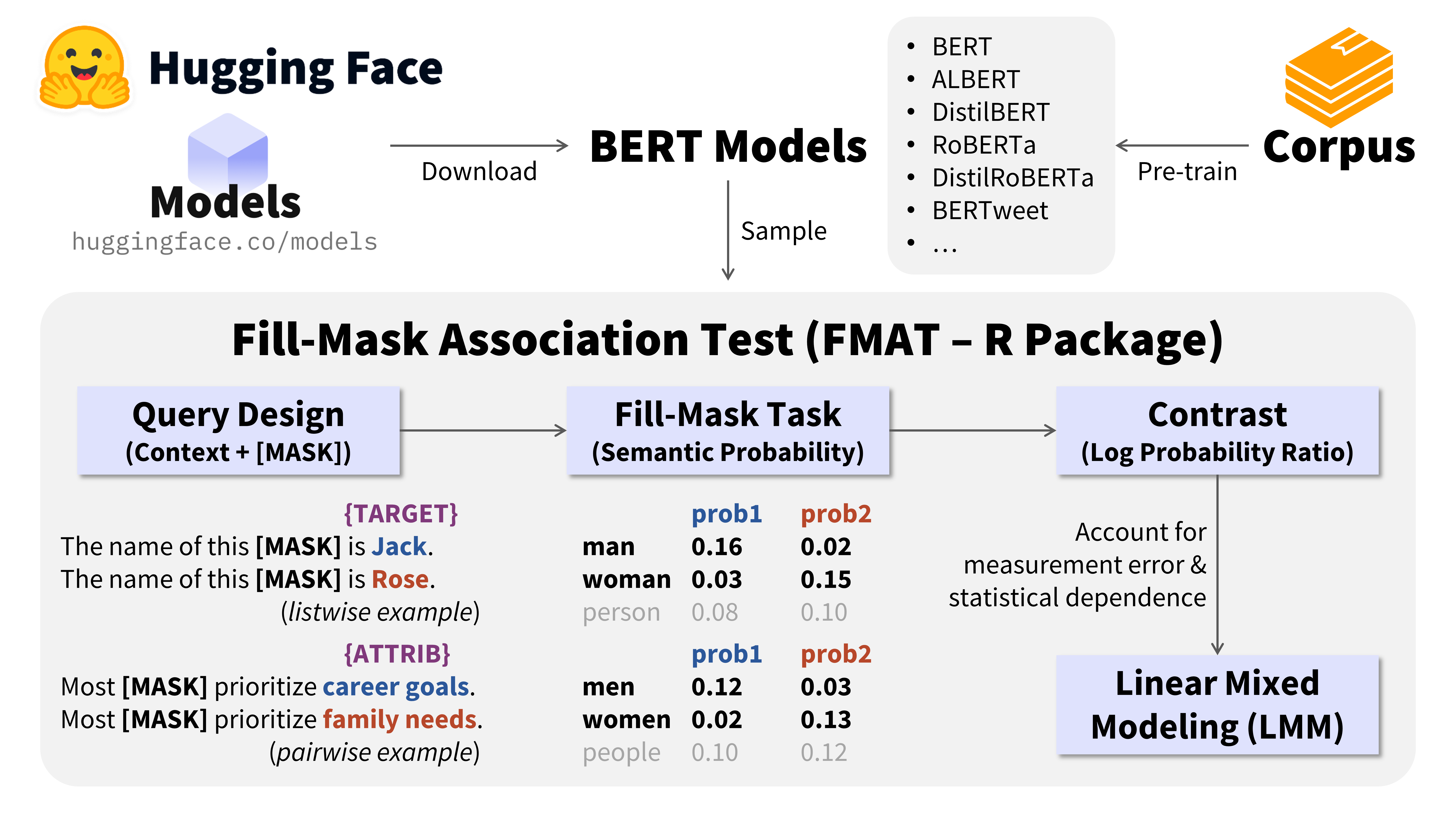😷 The Fill-Mask Association Test (掩码填空联系测验).
The Fill-Mask Association Test (FMAT) is an integrative and probability-based method using BERT Models to measure conceptual associations (e.g., attitudes, biases, stereotypes, social norms, cultural values) as propositions in natural language (Bao, 2024, JPSP).
⚠️ Please update this package to version ≥ 2025.4 for faster and more robust functionality.


Citation
(1) FMAT Package Citation
- Bao, H.-W.-S. (2023). FMAT: The Fill-Mask Association Test. https://CRAN.R-project.org/package=FMAT
-
Note: This is the original citation. Please refer to the information when you
library(FMAT)for the APA-7 format of the version you installed.
-
Note: This is the original citation. Please refer to the information when you
(2) FMAT Research Articles - Methodology
- Bao, H.-W.-S. (2024). The Fill-Mask Association Test (FMAT): Measuring propositions in natural language. Journal of Personality and Social Psychology, 127(3), 537–561. https://doi.org/10.1037/pspa0000396
(3) FMAT Research Articles - Application
- Bao, H.-W.-S., & Gries, P. (2024). Intersectional race–gender stereotypes in natural language. British Journal of Social Psychology, 63(4), 1771–1786. https://doi.org/10.1111/bjso.12748
- Bao, H.-W.-S., & Gries, P. (2025). Bias toward Chinese in English language use. China Quarterly. (accepted)
Installation
The R package FMAT and three Python packages (transformers, torch, huggingface-hub) all need to be installed.
(1) R Package
## Method 1: Install from CRAN
install.packages("FMAT")
## Method 2: Install from GitHub
install.packages("devtools")
devtools::install_github("psychbruce/FMAT", force=TRUE)(2) Python Environment and Packages
Install Anaconda (a recommended package manager that automatically installs Python, its IDEs like Spyder, and a large list of common Python packages).
Specify the Anaconda’s Python interpreter in RStudio.
RStudio → Tools → Global/Project Options
→ Python → Select → Conda Environments
→ Choose “…/Anaconda3/python.exe”
Install specific versions of Python packages “transformers”, “torch”, and “huggingface-hub”.
(RStudio Terminal / Anaconda Prompt / Windows Command)
For CPU users:
pip install transformers==4.40.2 torch==2.2.1 huggingface-hub==0.20.3For GPU (CUDA) users:
pip install transformers==4.40.2 huggingface-hub==0.20.3
pip install torch==2.2.1 --index-url https://download.pytorch.org/whl/cu121To use some models (e.g., microsoft/deberta-v3-base), “You need to have sentencepiece installed to convert a slow tokenizer to a fast one”:
pip install sentencepiece- See Guidance for GPU Acceleration for installation guidance if you have an NVIDIA GPU device on your PC and want to use GPU to accelerate the pipeline.
- According to the May 2024 releases, “transformers” ≥ 4.41 depends on “huggingface-hub” ≥ 0.23. The suggested versions of “transformers” (4.40.2) and “huggingface-hub” (0.20.3) ensure the console display of progress bars when downloading BERT models while keeping these packages as new as possible.
- Proxy users may use the “global mode” (全局模式) to download models.
- If you find the error
HTTPSConnectionPool(host='huggingface.co', port=443), please try to (1) reinstall Anaconda so that some unknown issues may be fixed, or (2) downgrade the “urllib3” package to version ≤ 1.25.11 (pip install urllib3==1.25.11) so that it will use HTTP proxies (rather than HTTPS proxies as in later versions) to connect to Hugging Face.
Guidance for FMAT
Step 1: Download BERT Models
Use BERT_download() to download BERT models. Model files are saved in your local cache folder “%USERPROFILE%/.cache/huggingface”. A full list of BERT models are available at Hugging Face.
Use BERT_info() and BERT_vocab() to obtain detailed information of BERT models.
Step 2: Design FMAT Queries
Design queries that conceptually represent the constructs you would measure (see Bao, 2024, JPSP for how to design queries).
Use FMAT_query() and/or FMAT_query_bind() to prepare a data.table of queries.
Step 3: Run FMAT
Use FMAT_run() to get raw data (probability estimates) for further analysis.
Several steps of preprocessing have been included in the function for easier use (see FMAT_run() for details).
- For BERT variants using
<mask>rather than[MASK]as the mask token, the input query will be automatically modified so that users can always use[MASK]in query design. - For some BERT variants, special prefix characters such as
\u0120and\u2581will be automatically added to match the whole words (rather than subwords) for[MASK].
Notes
- Improvements are ongoing, especially for adaptation to more diverse (less popular) BERT models.
- If you find bugs or have problems using the functions, please report them at GitHub Issues or send me an email.
Guidance for GPU Acceleration
By default, the FMAT package uses CPU to enable the functionality for all users. But for advanced users who want to accelerate the pipeline with GPU, the FMAT_run() function now supports using a GPU device, about 3x faster than CPU.
Test results (on the developer’s computer, depending on BERT model size):
- CPU (Intel 13th-Gen i7-1355U): 500~1000 queries/min
- GPU (NVIDIA GeForce RTX 2050): 1500~3000 queries/min
Checklist:
- Ensure that you have an NVIDIA GPU device (e.g., GeForce RTX Series) and an NVIDIA GPU driver installed on your system.
- Install PyTorch (Python
torchpackage) with CUDA support.- Find guidance for installation command at https://pytorch.org/get-started/locally/.
- CUDA is available only on Windows and Linux, but not on MacOS.
- If you have installed a version of
torchwithout CUDA support, please first uninstall it (command:pip uninstall torch) and then install the suggested one. - You may also install the corresponding version of CUDA Toolkit (e.g., for the
torchversion supporting CUDA 12.1, the same version of CUDA Toolkit 12.1 may also be installed).
Example code for installing PyTorch with CUDA support:
(RStudio Terminal / Anaconda Prompt / Windows Command)
pip install torch==2.2.1 --index-url https://download.pytorch.org/whl/cu121BERT Models
The reliability and validity of the following 12 BERT models in the FMAT have been established in our research, but future work is needed to examine the performance of other models.
(model name on Hugging Face - model file size)
- bert-base-uncased (420 MB)
- bert-base-cased (416 MB)
- bert-large-uncased (1283 MB)
- bert-large-cased (1277 MB)
- distilbert-base-uncased (256 MB)
- distilbert-base-cased (251 MB)
- albert-base-v1 (45 MB)
- albert-base-v2 (45 MB)
- roberta-base (476 MB)
- distilroberta-base (316 MB)
- vinai/bertweet-base (517 MB)
- vinai/bertweet-large (1356 MB)
For details about BERT, see:
- What is Fill-Mask? [HuggingFace]
- An Explorable BERT [HuggingFace]
- BERT Model Documentation [HuggingFace]
- Illustrated BERT
- Visual Guide to BERT
library(FMAT)
models = c(
"bert-base-uncased",
"bert-base-cased",
"bert-large-uncased",
"bert-large-cased",
"distilbert-base-uncased",
"distilbert-base-cased",
"albert-base-v1",
"albert-base-v2",
"roberta-base",
"distilroberta-base",
"vinai/bertweet-base",
"vinai/bertweet-large"
)
BERT_download(models)ℹ Device Info:
R Packages:
FMAT 2024.5
reticulate 1.36.1
Python Packages:
transformers 4.40.2
torch 2.2.1+cu121
NVIDIA GPU CUDA Support:
CUDA Enabled: TRUE
CUDA Version: 12.1
GPU (Device): NVIDIA GeForce RTX 2050
── Downloading model "bert-base-uncased" ──────────────────────────────────────────
→ (1) Downloading configuration...
config.json: 100%|██████████| 570/570 [00:00<00:00, 114kB/s]
→ (2) Downloading tokenizer...
tokenizer_config.json: 100%|██████████| 48.0/48.0 [00:00<00:00, 23.9kB/s]
vocab.txt: 100%|██████████| 232k/232k [00:00<00:00, 1.50MB/s]
tokenizer.json: 100%|██████████| 466k/466k [00:00<00:00, 1.98MB/s]
→ (3) Downloading model...
model.safetensors: 100%|██████████| 440M/440M [00:36<00:00, 12.1MB/s]
✔ Successfully downloaded model "bert-base-uncased"
── Downloading model "bert-base-cased" ────────────────────────────────────────────
→ (1) Downloading configuration...
config.json: 100%|██████████| 570/570 [00:00<00:00, 63.3kB/s]
→ (2) Downloading tokenizer...
tokenizer_config.json: 100%|██████████| 49.0/49.0 [00:00<00:00, 8.66kB/s]
vocab.txt: 100%|██████████| 213k/213k [00:00<00:00, 1.39MB/s]
tokenizer.json: 100%|██████████| 436k/436k [00:00<00:00, 10.1MB/s]
→ (3) Downloading model...
model.safetensors: 100%|██████████| 436M/436M [00:37<00:00, 11.6MB/s]
✔ Successfully downloaded model "bert-base-cased"
── Downloading model "bert-large-uncased" ─────────────────────────────────────────
→ (1) Downloading configuration...
config.json: 100%|██████████| 571/571 [00:00<00:00, 268kB/s]
→ (2) Downloading tokenizer...
tokenizer_config.json: 100%|██████████| 48.0/48.0 [00:00<00:00, 12.0kB/s]
vocab.txt: 100%|██████████| 232k/232k [00:00<00:00, 1.50MB/s]
tokenizer.json: 100%|██████████| 466k/466k [00:00<00:00, 1.99MB/s]
→ (3) Downloading model...
model.safetensors: 100%|██████████| 1.34G/1.34G [01:36<00:00, 14.0MB/s]
✔ Successfully downloaded model "bert-large-uncased"
── Downloading model "bert-large-cased" ───────────────────────────────────────────
→ (1) Downloading configuration...
config.json: 100%|██████████| 762/762 [00:00<00:00, 125kB/s]
→ (2) Downloading tokenizer...
tokenizer_config.json: 100%|██████████| 49.0/49.0 [00:00<00:00, 12.3kB/s]
vocab.txt: 100%|██████████| 213k/213k [00:00<00:00, 1.41MB/s]
tokenizer.json: 100%|██████████| 436k/436k [00:00<00:00, 5.39MB/s]
→ (3) Downloading model...
model.safetensors: 100%|██████████| 1.34G/1.34G [01:35<00:00, 14.0MB/s]
✔ Successfully downloaded model "bert-large-cased"
── Downloading model "distilbert-base-uncased" ────────────────────────────────────
→ (1) Downloading configuration...
config.json: 100%|██████████| 483/483 [00:00<00:00, 161kB/s]
→ (2) Downloading tokenizer...
tokenizer_config.json: 100%|██████████| 48.0/48.0 [00:00<00:00, 9.46kB/s]
vocab.txt: 100%|██████████| 232k/232k [00:00<00:00, 16.5MB/s]
tokenizer.json: 100%|██████████| 466k/466k [00:00<00:00, 14.8MB/s]
→ (3) Downloading model...
model.safetensors: 100%|██████████| 268M/268M [00:19<00:00, 13.5MB/s]
✔ Successfully downloaded model "distilbert-base-uncased"
── Downloading model "distilbert-base-cased" ──────────────────────────────────────
→ (1) Downloading configuration...
config.json: 100%|██████████| 465/465 [00:00<00:00, 233kB/s]
→ (2) Downloading tokenizer...
tokenizer_config.json: 100%|██████████| 49.0/49.0 [00:00<00:00, 9.80kB/s]
vocab.txt: 100%|██████████| 213k/213k [00:00<00:00, 1.39MB/s]
tokenizer.json: 100%|██████████| 436k/436k [00:00<00:00, 8.70MB/s]
→ (3) Downloading model...
model.safetensors: 100%|██████████| 263M/263M [00:24<00:00, 10.9MB/s]
✔ Successfully downloaded model "distilbert-base-cased"
── Downloading model "albert-base-v1" ─────────────────────────────────────────────
→ (1) Downloading configuration...
config.json: 100%|██████████| 684/684 [00:00<00:00, 137kB/s]
→ (2) Downloading tokenizer...
tokenizer_config.json: 100%|██████████| 25.0/25.0 [00:00<00:00, 3.57kB/s]
spiece.model: 100%|██████████| 760k/760k [00:00<00:00, 4.93MB/s]
tokenizer.json: 100%|██████████| 1.31M/1.31M [00:00<00:00, 13.4MB/s]
→ (3) Downloading model...
model.safetensors: 100%|██████████| 47.4M/47.4M [00:03<00:00, 13.4MB/s]
✔ Successfully downloaded model "albert-base-v1"
── Downloading model "albert-base-v2" ─────────────────────────────────────────────
→ (1) Downloading configuration...
config.json: 100%|██████████| 684/684 [00:00<00:00, 137kB/s]
→ (2) Downloading tokenizer...
tokenizer_config.json: 100%|██████████| 25.0/25.0 [00:00<00:00, 4.17kB/s]
spiece.model: 100%|██████████| 760k/760k [00:00<00:00, 5.10MB/s]
tokenizer.json: 100%|██████████| 1.31M/1.31M [00:00<00:00, 6.93MB/s]
→ (3) Downloading model...
model.safetensors: 100%|██████████| 47.4M/47.4M [00:03<00:00, 13.8MB/s]
✔ Successfully downloaded model "albert-base-v2"
── Downloading model "roberta-base" ───────────────────────────────────────────────
→ (1) Downloading configuration...
config.json: 100%|██████████| 481/481 [00:00<00:00, 80.3kB/s]
→ (2) Downloading tokenizer...
tokenizer_config.json: 100%|██████████| 25.0/25.0 [00:00<00:00, 6.25kB/s]
vocab.json: 100%|██████████| 899k/899k [00:00<00:00, 2.72MB/s]
merges.txt: 100%|██████████| 456k/456k [00:00<00:00, 8.22MB/s]
tokenizer.json: 100%|██████████| 1.36M/1.36M [00:00<00:00, 8.56MB/s]
→ (3) Downloading model...
model.safetensors: 100%|██████████| 499M/499M [00:38<00:00, 12.9MB/s]
✔ Successfully downloaded model "roberta-base"
── Downloading model "distilroberta-base" ─────────────────────────────────────────
→ (1) Downloading configuration...
config.json: 100%|██████████| 480/480 [00:00<00:00, 96.4kB/s]
→ (2) Downloading tokenizer...
tokenizer_config.json: 100%|██████████| 25.0/25.0 [00:00<00:00, 12.0kB/s]
vocab.json: 100%|██████████| 899k/899k [00:00<00:00, 6.59MB/s]
merges.txt: 100%|██████████| 456k/456k [00:00<00:00, 9.46MB/s]
tokenizer.json: 100%|██████████| 1.36M/1.36M [00:00<00:00, 11.5MB/s]
→ (3) Downloading model...
model.safetensors: 100%|██████████| 331M/331M [00:25<00:00, 13.0MB/s]
✔ Successfully downloaded model "distilroberta-base"
── Downloading model "vinai/bertweet-base" ────────────────────────────────────────
→ (1) Downloading configuration...
config.json: 100%|██████████| 558/558 [00:00<00:00, 187kB/s]
→ (2) Downloading tokenizer...
vocab.txt: 100%|██████████| 843k/843k [00:00<00:00, 7.44MB/s]
bpe.codes: 100%|██████████| 1.08M/1.08M [00:00<00:00, 7.01MB/s]
tokenizer.json: 100%|██████████| 2.91M/2.91M [00:00<00:00, 9.10MB/s]
→ (3) Downloading model...
pytorch_model.bin: 100%|██████████| 543M/543M [00:48<00:00, 11.1MB/s]
✔ Successfully downloaded model "vinai/bertweet-base"
── Downloading model "vinai/bertweet-large" ───────────────────────────────────────
→ (1) Downloading configuration...
config.json: 100%|██████████| 614/614 [00:00<00:00, 120kB/s]
→ (2) Downloading tokenizer...
vocab.json: 100%|██████████| 899k/899k [00:00<00:00, 5.90MB/s]
merges.txt: 100%|██████████| 456k/456k [00:00<00:00, 7.30MB/s]
tokenizer.json: 100%|██████████| 1.36M/1.36M [00:00<00:00, 8.31MB/s]
→ (3) Downloading model...
pytorch_model.bin: 100%|██████████| 1.42G/1.42G [02:29<00:00, 9.53MB/s]
✔ Successfully downloaded model "vinai/bertweet-large"
── Downloaded models: ──
size
albert-base-v1 45 MB
albert-base-v2 45 MB
bert-base-cased 416 MB
bert-base-uncased 420 MB
bert-large-cased 1277 MB
bert-large-uncased 1283 MB
distilbert-base-cased 251 MB
distilbert-base-uncased 256 MB
distilroberta-base 316 MB
roberta-base 476 MB
vinai/bertweet-base 517 MB
vinai/bertweet-large 1356 MB
✔ Downloaded models saved at C:/Users/Bruce/.cache/huggingface/hub (6.52 GB)
BERT_info(models) model size vocab dims mask
<fctr> <char> <int> <int> <char>
1: bert-base-uncased 420MB 30522 768 [MASK]
2: bert-base-cased 416MB 28996 768 [MASK]
3: bert-large-uncased 1283MB 30522 1024 [MASK]
4: bert-large-cased 1277MB 28996 1024 [MASK]
5: distilbert-base-uncased 256MB 30522 768 [MASK]
6: distilbert-base-cased 251MB 28996 768 [MASK]
7: albert-base-v1 45MB 30000 128 [MASK]
8: albert-base-v2 45MB 30000 128 [MASK]
9: roberta-base 476MB 50265 768 <mask>
10: distilroberta-base 316MB 50265 768 <mask>
11: vinai/bertweet-base 517MB 64001 768 <mask>
12: vinai/bertweet-large 1356MB 50265 1024 <mask>(Tested 2024-05-16 on the developer’s computer: HP Probook 450 G10 Notebook PC)
Related Packages
While the FMAT is an innovative method for the computational intelligent analysis of psychology and society, you may also seek for an integrative toolbox for other text-analytic methods. Another R package I developed—PsychWordVec—is useful and user-friendly for word embedding analysis (e.g., the Word Embedding Association Test, WEAT). Please refer to its documentation and feel free to use it.
